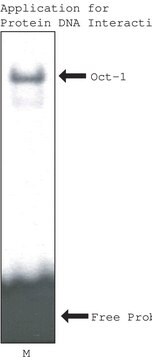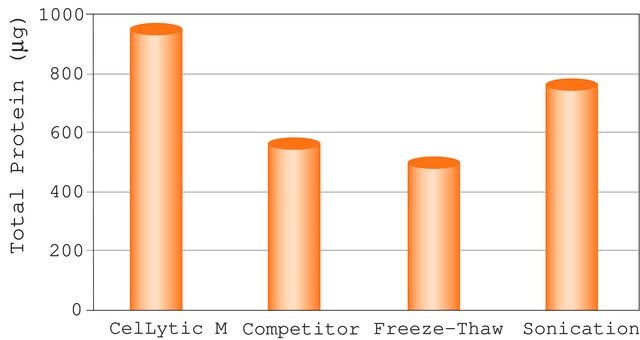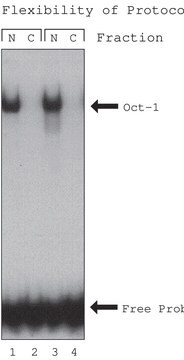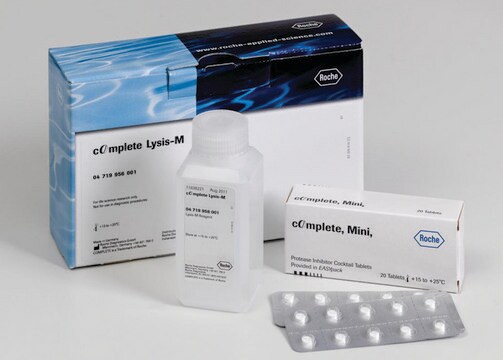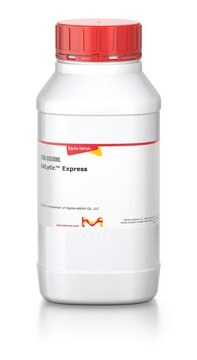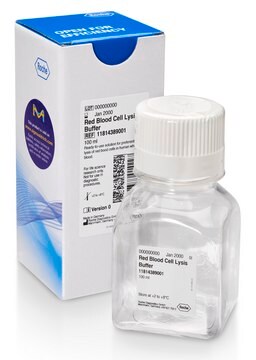MCL1
Mammalian Cell Lysis Kit
Synonyme(s) :
Cell Lysis Reagent
Se connecterpour consulter vos tarifs contractuels et ceux de votre entreprise/organisme
About This Item
Code UNSPSC :
12352200
Nomenclature NACRES :
NA.56
Produits recommandés
Utilisation
kit sufficient for 250 extractions (100 mm tissue culture plates)
Niveau de qualité
Technique(s)
immunoprecipitation (IP): suitable
Conditions d'expédition
dry ice
Température de stockage
−20°C
Application
The product contains all required reagents for the disintegration of mammalian cells and tissue for subsequent analysis of protein targets. Cellular proteins are stabilized during lysis and are suitable for immunoassays, immunoprecipitation, affinity purification and other functional assays.
Mammalian cell lysis kit was used to test the role of vascular endothelial growth factor (VEGF) receptor-1 and its ligand VEGF-B in motor neuron degeneration.
Mammalian cell lysis kit was used to test the role of vascular endothelial growth factor (VEGF) receptor-1 and its ligand VEGF-B in motor neuron degeneration.
Caractéristiques et avantages
- The kit can be used to prepare cell lysis buffer and other modified buffers
- The kit enables the researcher to change the buffer′s components to obtain maximum efficiency for a specific protein
Composants
The mammalian cell lysis kit is composed of solutions to be mixed and used for lysis of adherent cells, non-adherent cells, and tissues. It contains buffer, detergents, NaCl and protease inhibitor cocktail solutions.
Composants de kit également disponibles séparément
Réf. du produit
Description
FDS
- P8340Protease inhibitor cocktail 2.5 mLFDS
Mention d'avertissement
Danger
Mentions de danger
Classification des risques
Acute Tox. 4 Inhalation - Acute Tox. 4 Oral - Aquatic Chronic 3 - Eye Dam. 1 - Skin Irrit. 2 - STOT SE 3
Organes cibles
Respiratory system
Code de la classe de stockage
10 - Combustible liquids
Point d'éclair (°F)
Not applicable
Point d'éclair (°C)
Not applicable
Faites votre choix parmi les versions les plus récentes :
Déjà en possession de ce produit ?
Retrouvez la documentation relative aux produits que vous avez récemment achetés dans la Bibliothèque de documents.
Les clients ont également consulté
Jingfang Gao et al.
Cancer cell international, 14(1), 72-72 (2014-10-04)
Transforming growth factor beta (TGF-β) plays major roles in tumorigenesis by regulating cell growth, epithelial-to-mesenchymal transition (EMT), migration/invasion and metastasis. The epithelial markers E-cadherin, claudin-3 and claudin-4, commonly decreased in human adenocarcinomas are actually up regulated during ovarian carcinogenesis. In
L Martyniszyn et al.
Polish journal of veterinary sciences, 16(1), 25-32 (2013-05-23)
Autophagy is a self-degradation process of cellular components. It plays both antiviral and pro-viral roles in the life cycle of different viruses and the pathogenesis of different viral diseases. In this study, we evaluated autophagy induction in splenocytes of ectromelia
Shintaro Nakao et al.
The American journal of pathology, 178(4), 1913-1921 (2011-03-26)
Vascular adhesion protein-1 (VAP-1) contributes to inflammatory and angiogenic diseases, including cancer and age-related macular degeneration. It is expressed in blood vessels and contributes to inflammatory leukocyte recruitment. The cytokines IL-1β and vascular endothelial growth factor A (VEGF-A) modulate angiogenesis
Molecular imaging reveals elevated VEGFR-2 expression in retinal capillaries in diabetes: a novel biomarker for early diagnosis.
Sun D, Nakao S, Xie F, et al.
Faseb Journal (2014)
Shintaro Nakao et al.
Investigative ophthalmology & visual science, 54(6), 3830-3836 (2013-04-13)
Inflammation and immune cells regulate choroidal neovascularization (CNV) and could become therapeutic targets in age-related macular degeneration (AMD). Lymphangiogenesis is a key component of various inflammatory diseases. Whether lymphangiogenesis and lymph node-mediated immunity are involved in the pathogenesis of AMD
Notre équipe de scientifiques dispose d'une expérience dans tous les secteurs de la recherche, notamment en sciences de la vie, science des matériaux, synthèse chimique, chromatographie, analyse et dans de nombreux autres domaines..
Contacter notre Service technique



